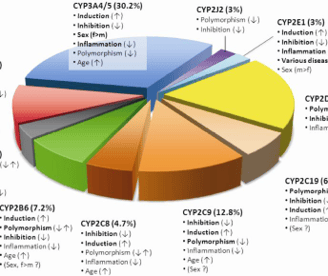Major genes involved in drug response
SoThere are many genes that can influence a patient's response to drugs, usually those that code for drug metabolizing enzymes, transporters or receptors. Some examples are:
CYP2D6: This gene encodes a liver enzyme that metabolizes many drugs, including some analgesics, antidepressants, and antipsychotics. Several genetic variants of this gene can affect the activity of the enzyme, which can influence the appropriate dosage and efficacy of treatment.
CYP2C19: This gene also encodes a liver enzyme that metabolizes many drugs, including some anticoagulants and anti-ulcer drugs. Several genetic variants of this gene can affect the activity of the enzyme, which can influence the appropriate dosage and efficacy of treatment.
TPMT: This gene encodes an enzyme that metabolizes some drugs used in the treatment of autoimmune diseases, such as rheumatoid arthritis and inflammatory bowel disease. Genetic variants in this gene can influence the activity of the enzyme, which can increase the risk of serious side effects.
VKORC1: This gene encodes an enzyme that is involved in blood clotting and is the target of some anticoagulants, such as warfarin. Several genetic variants of this gene can affect the appropriate dose of warfarin and the risk of bleeding.
ABCB1: This gene encodes a protein that transports many drugs out of cells. Several genetic variants of this gene can affect the amount of drug that reaches the site of action, which can influence the effectiveness of treatment.
These are just a few examples of the many genes that can influence a patient's response to drugs. Pharmacogenetics uses genetic analysis techniques such as real-time PCR and gene sequencing to identify variants in each patient that can influence drug response and, consequently, tailor treatments to each patient's individual needs.
If you have any questions, ask whatever you want!




